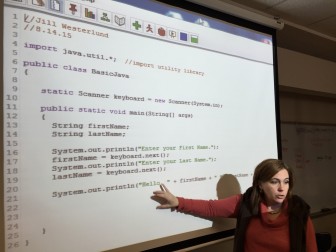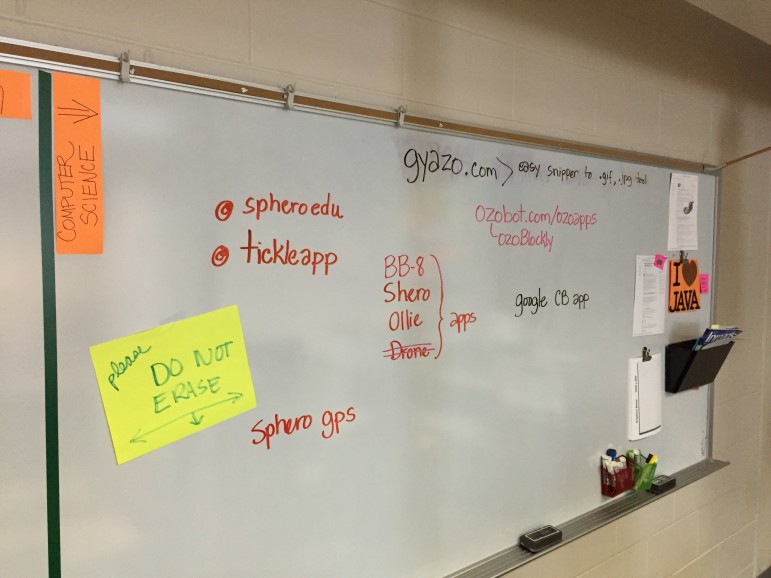Priming the Pipeline for STEM in the South: Student Incentives in Alabama
Given thousands of related job openings but only hundreds of computer science college graduates, Alabama is trying to ramp up its computer science education. That includes a new policy allowing those classes to count toward core math graduation requirements. WBHM’s Dan Carsen concludes the Southern Education Desk series “Priming the Pipeline for STEM in the South” with a visit to a Birmingham-area class that’s leading the way. Listen above or read below.
Hoover High School junior Griffin Davis is all about his computer science class.
“Honestly, this is probably my favorite part of the day,” he says, “because I get to come in here and I get to be on the cutting edge of things. I get to be … what’s next.”
He’s engineered 3-D-printed parts that’ll help drones drop probes into the Cahaba River, and he’s helped teach programming to grade-schoolers. That’s the type of interest this new class is meant to spark. It’s a more accessible version of an Advanced Placement computer science course — sort of like a science class for non-science majors. It’s meant to be less intimidating than the older, more specialized standard AP course and attract kids from all backgrounds.
Jill Westerlund teaches both classes — about 40 students altogether. She also writes a computer-science education blog.
“I would love it if every student had a course that incorporated some concepts of technology, whether they’re thinking about innovation, global impact, ethical issues,” she says. “And there’s no way that computer science isn’t a part of everything, whether you’re a mechanic, whether you’re an engineer, whether you’re an accountant.”
The national nonprofit code.org wants to smooth that pathway from class to career. It’s teaming up with educators — not to mention providing funding — to boost the number of computer science teachers in the state from 50 to 100 by next school year.
This year, “comp sci” classes can count toward math graduation requirements.
“That definitely makes sense,” says Davis. “Programming is a whole bunch of data. And you just have to interpret it and then make it easy to use.”
On coding possibly counting as a foreign language in Florida, Davis says, “It definitely is [a foreign language]. The reason I really enjoy programming is … I picked up Spanish really easily; language came easily to me. And I like building things too. I’ve wanted to be an engineer since I was born, basically. So, what programming allows me to do is put those two things together.”
And he says of computer science what foreign-language experts say about their field: “Start it earlier. In elementary school.”
After more than two decades of teaching, Jill Westerlund agrees. As for allowing computer science classes to count toward math graduation requirements, she sees pros and cons.
“A student would be able to take more credits toward their goal in college or the workforce,” she says. “The con, if they’re going to go on to college: do you really want to miss a year of drill-down math on daily basis? Computer science is built on math, but it’s not the same as math homework and math problems every single day.”
But she also thinks the pairing could ultimately increase funding for computer science classes and access for kids across Alabama. The results remain to be seen because the policy and the partnership are so new. What seems certain now, though, is that more kids are getting fired up and engaged in computer science and possibly becoming very employable in the process.
The Southern Education Desk is supported by a grant from the Corporation for Public Broadcasting. You can access the series and learn more at southerneddesk.org.
Malinowski concedes to Mejia in Democratic House special primary in New Jersey
With the race still too close to call, former congressman Tom Malinowski conceded to challenger Analilia Mejia in a Democratic primary to replace the seat vacated by New Jersey Gov. Mikie Sherrill.
FBI release photos and video of potential suspect in Guthrie disappearance
An armed, masked subject was caught on Nancy Guthrie's front doorbell camera one the morning she disappeared.
Reporter’s notebook: A Dutch speedskater and a U.S. influencer walk into a bar …
NPR's Rachel Treisman took a pause from watching figure skaters break records to see speed skaters break records. Plus, the surreal experience of watching backflip artist Ilia Malinin.
In Beirut, Lebanon’s cats of war find peace on university campus
The American University of Beirut has long been a haven for cats abandoned in times if war or crisis, but in recent years the feline population has grown dramatically.
Judge rules 7-foot center Charles Bediako is no longer eligible to play for Alabama
Bediako was playing under a temporary restraining order that allowed the former NBA G League player to join Alabama in the middle of the season despite questions regarding his collegiate eligibility.
American Ben Ogden wins silver, breaking 50 year medal drought for U.S. men’s cross-country skiing
Ben Ogden of Vermont skied powerfully, finishing just behind Johannes Hoesflot Klaebo of Norway. It was the first Olympic medal for a U.S. men's cross-country skier since 1976.








